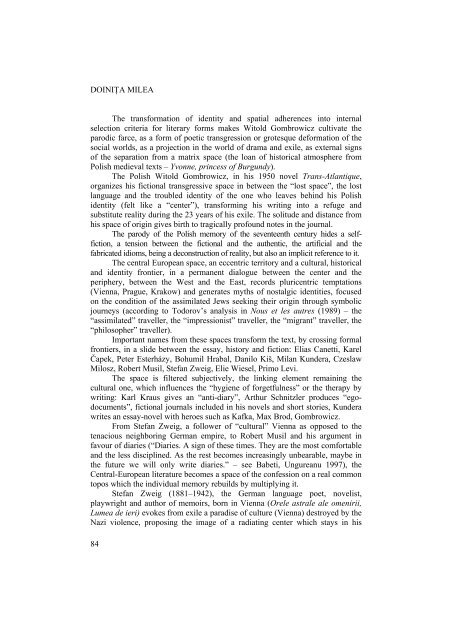culture, subculture and counterculture - Facultatea de Litere
culture, subculture and counterculture - Facultatea de Litere
culture, subculture and counterculture - Facultatea de Litere
You also want an ePaper? Increase the reach of your titles
YUMPU automatically turns print PDFs into web optimized ePapers that Google loves.
DOINIŢA MILEA<br />
The transformation of i<strong>de</strong>ntity <strong>and</strong> spatial adherences into internal<br />
selection criteria for literary forms makes Witold Gombrowicz cultivate the<br />
parodic farce, as a form of poetic transgression or grotesque <strong>de</strong>formation of the<br />
social worlds, as a projection in the world of drama <strong>and</strong> exile, as external signs<br />
of the separation from a matrix space (the loan of historical atmosphere from<br />
Polish medieval texts – Yvonne, princess of Burgundy).<br />
The Polish Witold Gombrowicz, in his 1950 novel Trans-Atlantique,<br />
organizes his fictional transgressive space in between the “lost space”, the lost<br />
language <strong>and</strong> the troubled i<strong>de</strong>ntity of the one who leaves behind his Polish<br />
i<strong>de</strong>ntity (felt like a “center”), transforming his writing into a refuge <strong>and</strong><br />
substitute reality during the 23 years of his exile. The solitu<strong>de</strong> <strong>and</strong> distance from<br />
his space of origin gives birth to tragically profound notes in the journal.<br />
The parody of the Polish memory of the seventeenth century hi<strong>de</strong>s a selffiction,<br />
a tension between the fictional <strong>and</strong> the authentic, the artificial <strong>and</strong> the<br />
fabricated idioms, being a <strong>de</strong>construction of reality, but also an implicit reference to it.<br />
The central European space, an eccentric territory <strong>and</strong> a cultural, historical<br />
<strong>and</strong> i<strong>de</strong>ntity frontier, in a permanent dialogue between the center <strong>and</strong> the<br />
periphery, between the West <strong>and</strong> the East, records pluricentric temptations<br />
(Vienna, Prague, Krakow) <strong>and</strong> generates myths of nostalgic i<strong>de</strong>ntities, focused<br />
on the condition of the assimilated Jews seeking their origin through symbolic<br />
journeys (according to Todorov’s analysis in Nous et les autres (1989) – the<br />
“assimilated” traveller, the “impressionist” traveller, the “migrant” traveller, the<br />
“philosopher” traveller).<br />
Important names from these spaces transform the text, by crossing formal<br />
frontiers, in a sli<strong>de</strong> between the essay, history <strong>and</strong> fiction: Elias Canetti, Karel<br />
Čapek, Peter Esterházy, Bohumil Hrabal, Danilo Kiš, Milan Kun<strong>de</strong>ra, Czeslaw<br />
Milosz, Robert Musil, Stefan Zweig, Elie Wiesel, Primo Levi.<br />
The space is filtered subjectively, the linking element remaining the<br />
cultural one, which influences the “hygiene of forgetfulness” or the therapy by<br />
writing: Karl Kraus gives an “anti-diary”, Arthur Schnitzler produces “egodocuments”,<br />
fictional journals inclu<strong>de</strong>d in his novels <strong>and</strong> short stories, Kun<strong>de</strong>ra<br />
writes an essay-novel with heroes such as Kafka, Max Brod, Gombrowicz.<br />
From Stefan Zweig, a follower of “cultural” Vienna as opposed to the<br />
tenacious neighboring German empire, to Robert Musil <strong>and</strong> his argument in<br />
favour of diaries (“Diaries. A sign of these times. They are the most comfortable<br />
<strong>and</strong> the less disciplined. As the rest becomes increasingly unbearable, maybe in<br />
the future we will only write diaries.” – see Babeti, Ungureanu 1997), the<br />
Central-European literature becomes a space of the confession on a real common<br />
topos which the individual memory rebuilds by multiplying it.<br />
Stefan Zweig (1881–1942), the German language poet, novelist,<br />
playwright <strong>and</strong> author of memoirs, born in Vienna (Orele astrale ale omenirii,<br />
Lumea <strong>de</strong> ieri) evokes from exile a paradise of <strong>culture</strong> (Vienna) <strong>de</strong>stroyed by the<br />
Nazi violence, proposing the image of a radiating center which stays in his<br />
84












